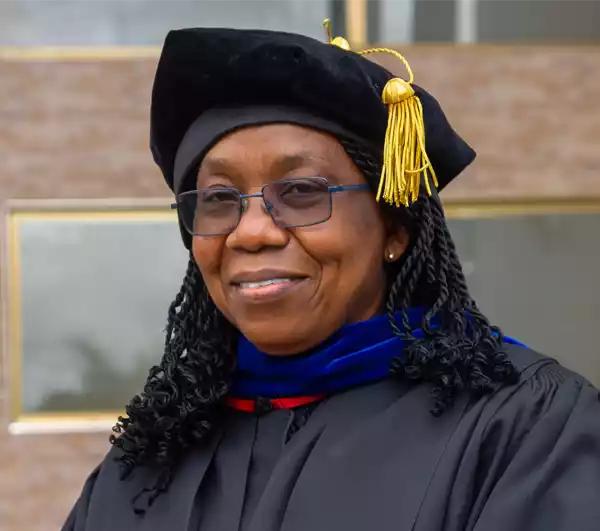
Rev Prof. Dorothy BEA Akoto
(Dip./BA Eng & Edu (UCC) M.A.C.E/MDiv (ITC) MTh (Emory), Mth (UNION_PSCE) PHD (CTS) Chicago)
- Position
Lecturer
Rev. Prof. Dorothy BEA Akoto is a highly esteemed theologian, educator, and ordained minister whose profound influence extends across the realms of theological education and biblical studies. Rooted in a strong academic foundation, her journey began with a Diploma in English from U.C.C., A.T.T.C., Ghana in 1982, followed by a Bachelor of Arts in English and Education from the University of Cape Coast (UCC).
Driven by her passion for teaching and learning, Rev. Prof. Akoto pursued advanced studies in theology, earning a Master of Divinity (MDiv) and a Master of Arts in Christian Education (MACE) from ITC, JCSS, Atlanta, Georgia, U.S.A. in 1996. She further honed her theological acumen with a Master of Theology (MTH) from Emory, Candler School of Theology (E.U. C.S.T.) in Decatur, Georgia, U.S.A. in 1997, and another MTH from UNION-PSCE in Richmond, Virginia, U.S.A. in 2004.
Her academic journey reached its pinnacle with a Doctor of Philosophy (Ph.D.) in Bible, Culture, and Hermeneutics from the esteemed Chicago Theological Seminary (CTS) in Chicago, Illinois, U.S.A. in 2012. Her doctoral research delved deeply into subjects such as Old Testament (Hebrew Bible), Biblical Hebrew Language, and Gender Studies, reflecting her commitment to exploring diverse theological perspectives.
Rev. Prof. Akoto's scholarly pursuits have been guided by her profound research interests, which include Biblical Hermeneutics, Cultural Communication, and the Wisdom Literature of the Hebrew Bible, particularly focusing on Biblical and African Proverbial Communication, as well as Postcolonial and Feminist Biblical Interpretation.
Throughout her illustrious career, Rev. Prof. Akoto has held various academic and leadership positions, including faculty roles at institutions such as the University of Cape Coast and the Institute of Theology, Mission, and Culture. Her commitment to holistic ministry, integrating rigorous scholarship with practical pastoral care, has made her a revered figure within both academic and religious communities.
As an ordained minister, Rev. Prof. Akoto has provided spiritual guidance and pastoral care to congregations, embodying her belief in the integration of academic excellence with compassionate ministry. Her numerous publications and presentations have enriched theological discourse, leaving an indelible mark on the landscape of theological education and biblical studies.
Rev. Prof. Dorothy BEA Akoto continues to inspire and empower individuals to engage critically with scripture, theological issues, and social justice, embodying a profound commitment to academic rigour, spiritual formation, and transformative leadership.
|
Books Akoto (Abutiate), Dorothy BEA. Lord Teach Us to Pray. Accra, Ghana. GAVOSS Education PLC LTD, 2018. | |
|
_____. African Theology/ies: A Contemporary Mosaical Approach. Bloomington, Indianapolis: AuthorHouse LLC Pub., 2014. | |
|
_____. Proverbs and the African Tree of Life: Grafting Proverbs 25--29 onto Ghanaian Ewe Folk Proverbs. Netherlands: Brill, 2012. | |
|
Amoah, Elizabeth, Dorcas Akintunde and Dorothy Akoto, eds. Cultural Practices and HIV/AIDS: African Women’s Voices. Accra, Ghana: Sam-Woode, 2005. | |
|
Book-Chapters/Journal Articles
Akoto, Dorothy BEA. “Woman Wisdom, the Feminine Consort of the Divine and the African Theosophical Worldview.” Journal of Black Women and Religious Cultures (BW&RC) Volume 3, No. 1 (2022): 21--42. University of Minnesota Press. | |
|
_____ . “Bible and Poverty-Reduction: A Feminist Gender-Sensitive Approach.” Journal of the West African Association of Theological Institutions (WAATI) Volume 2 No. 3 (2021): 18—41. | |
|
_____. “Respecting the Dignity of God’s Image in Every Human Being (Gen 1:26-27): Using Christian Education to Promote Respect and Dignity As the Rights of Children.” In Journal of the West African Association of Theological Institutions (WAATI). Volume 2, Number 1 (2019): 31--47. | |
|
_____. “The “Great Commission” Actualized through the Work of the Holy Spirit in the Church Universal: African Independent Churches As a Case in Point.” In Rethinking the Great Commission:Emerging African Perspectives. Edited by Emmanuel K. Asante and David N.A. Kpobi. 33—52. Accra, Ghana: Missiological Society of Ghana, 2018. | |
|
_____. “Sexualities, Masculinities, HIV and AIDS and the Bible in Africa: A Response.” In Navigating African Biblical Hermeneutics:Trend and Themes from Our Pots and Calabashes. Edited by Madipoane, Masenya (Ngwuan’a Mphahlele) and Kenneth N. Ngwa. 258—264. Cambridge, New York: Cambridge Scholars, 2018. | |
|
_____. “Gender and Culture in the Church and in Theological Education: Wounded-ness and the need for Healing.” In Trinity Journal of Church and Theology: Special 75th Anniversary Edition. Themed: Theological Education in Africa. Vol 19, No.2 (2017): 7--29. | |
|
_____. “The Book of Proverbs and its Relationship to African-Ewe Proverbial Communication.” Journal of the Interdenominational Theological Center. Sankofa: Inaugurating the Eight President of the ITC. Vol. 37. Issues and 2 (2011): 43—68. | |
|
_____ and Timothy J. Sandoval. “A Note on Qohelet 10:10b.” In Zeitschrift Für Die Altestamentliche Wissenschaft. Band 122.DE GROYTER (2010): 90—95. | |
|
_____. “Christianity in Ghana.” In Cambridge Dictionary of Christianity. Edited by Daniel Patte. 457-458. Cambridge, New York: Cambridge Univ. Press, 2010. | |
|
_____. “Esther,” in The Africana Bible: Reading Israel’s Scriptures from the African Diaspora. Edited by.Hugh R. Page, Randall C. Bailey, Valerie Bridgeman, et al. 268--272. Mineapolis, Minnesota: Augsburg/Fortress, 2010. | |
|
_____ . “Church and State: A Contemporary Understanding of the Book of Joel,” in Christianity Mission and Ecumenism in Ghana: Essays in Honour of Robert K. Aboagye-Mensah, ed. J. Asamoah-Gyadu. 135—152. Ghana: Christian Council of Ghana: Asempa Pubs. 2009. |
